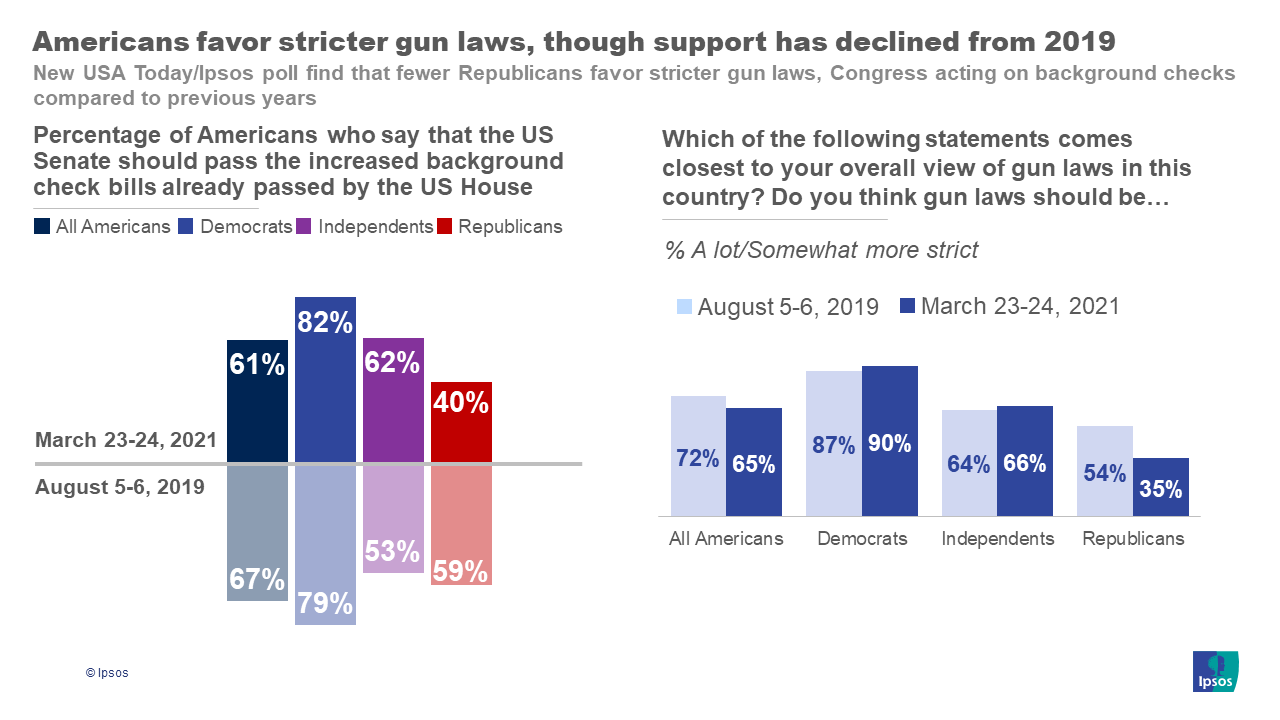Americans favor stricter gun laws, though support has declined from 2019
Washington, DC, March 24, 2021 — Two in three Americans think gun laws should be more strict than they are today, according to a new USA Today/Ipsos poll, conducted in the days immediately following a mass shooting in Boulder, CO. Though a majority are in favor of such reforms, this latest poll marks a decline in support from a similar USA Today/Ipsos survey in 2019. One of the primary causes for this shift is due to Republicans’ views on the subject changing; a vast majority of Democrats continue to favor stricter gun laws and congressional action on existing background check legislation.
Read the full story from USA Today here.
Detailed Findings
1. While a majority of Americans continue to favor stricter gun laws, support has declined over the past two to three years.
- Currently, 65% of Americans believe gun laws should be more strict than they are today, compared to 72% in 2019 and 75% in 2018.
- Since 2019, the partisan gap on this question has widened significantly. Now, 90% of Democrats favor stricter gun laws compared to just 35% of Republicans.
- Over the past two years, Democrats’ and Independents’ views have remained steady. Republican support for stricter gun laws, on the other hand, has dropped nearly 20 points in that time frame.
- Currently, a plurality of gun owners (47%) favor stricter gun laws in this country, but support is much lower than it is among non-gun owners (75%).
2. Three in five Americans believe the U.S. Senate should pass background check legislation. Here, too, the partisan divide has grown over time.
- Sixty-one percent of Americans say the U.S. Senate should pass increased background check bills that have already been passed by the U.S. House of Representatives, including 55% of gun owners.
- Strong majorities of Democrats (82%) and Independents (62%) say the Senate should take action, while Republicans are evenly split (40% yes, 41% no).
- This, too, marks a deepening partisan divide from 2019. Then, 67% said the Senate should act, and there was bipartisan agreement (79% of Democrats, 53% of Independents, and 59% of Republicans). The number of Republicans opposing Senate action has grown 17 percentage points since 2019.

3. As was the case in 2019, a majority of Americans believe the mental health system, racism and white nationalism, and loose gun laws are responsible for mass shootings in this country. Fewer place blame on gun manufacturers and the NRA.
- Seventy-three percent of Americans believe the mental health system is very or somewhat responsible for mass shootings in this country (unchanged from 2019), 61% agree when it comes to racism and white nationalism (down from 69%), and 57% hold loose gun laws responsible (down from 67%).
- Half of Americans (49%) believe gun manufacturers and the NRA are responsible, while 43% do not.
- Partisanship plays a significant role here as well. Democrats are significantly more likely than Republicans to blame gun manufacturers and the NRA, racism and white nationalism, loose gun laws, Donald Trump, and Republicans in Congress. Republicans, on the other hand, point to Democrats in Congress and President Joe Biden. However, both sides of the aisle agree that the mental health system is responsible for mass shootings.
About the Study
These are some of the findings of an Ipsos poll conducted between March 23-24, 2021 on behalf of USA Today. For this survey, a sample of roughly 1,005 adults age 18+ from the continental U.S., Alaska, and Hawaii was interviewed online in English. The sample includes 460 Democrats, 368 Republicans, and 111 Independents.
The sample was randomly drawn from Ipsos’ online panel, partner online panel sources, and “river” sampling and does not rely on a population frame in the traditional sense. Ipsos uses fixed sample targets, unique to each study, in drawing a sample. After a sample has been obtained from the Ipsos panel, Ipsos calibrates respondent characteristics to be representative of the U.S. Population using standard procedures such as raking-ratio adjustments. The source of these population targets is U.S. Census 2018 American Community Survey data. The sample drawn for this study reflects fixed sample targets on demographics. Posthoc weights were made to the population characteristics on gender, age, race/ethnicity, region, and education.
Statistical margins of error are not applicable to online non-probability polls. All sample surveys and polls may be subject to other sources of error, including, but not limited to coverage error and measurement error. Where figures do not sum to 100, this is due to the effects of rounding. The precision of Ipsos online polls is measured using a credibility interval. In this case, the poll has a credibility interval of plus or minus 3.5 percentage points for all respondents. Ipsos calculates a design effect (DEFF) for each study based on the variation of the weights, following the formula of Kish (1965). This study had a credibility interval adjusted for design effect of the following (n=1,005, DEFF=1.5, adjusted Confidence Interval=+/-5.0 percentage points).
The poll also has a credibility interval of plus or minus 5.2 percentage points for Democrats, plus or minus 5.8 percentage points for Republicans, and plus or minus 10.6 percentage points for Independents.
For more information on this news release, please contact:
Chris Jackson
Vice President, U.S., Public Affairs
Ipsos
+1 202 420-2025
[email protected]
Mallory Newall
Director, U.S., Public Affairs
Ipsos
+1 202 420-2014
[email protected]
About Ipsos
Ipsos is the world’s third largest Insights and Analytics company, present in 90 markets and employing more than 18,000 people.
Our passionately curious research professionals, analysts and scientists have built unique multi-specialist capabilities that provide true understanding and powerful insights into the actions, opinions and motivations of citizens, consumers, patients, customers or employees. We serve more than 5000 clients across the world with 75 business solutions.
Founded in France in 1975, Ipsos is listed on the Euronext Paris since July 1st, 1999. The company is part of the SBF 120 and the Mid-60 index and is eligible for the Deferred Settlement Service (SRD).
ISIN code FR0000073298, Reuters ISOS.PA, Bloomberg IPS:FP www.ipsos.com



